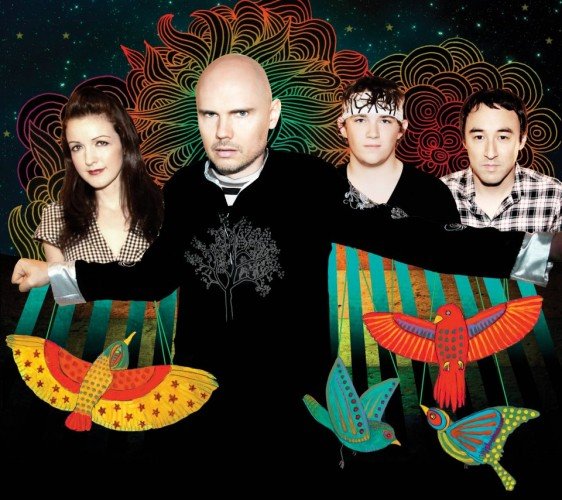Prior to its release, Billy Corgan hailed Oceania as the best Pumpkins record since the 1995 masterpiece Mellon Collie & The Infinite Sadness.
Claiming your next release is your finest work in nearly two decades should raise many an eyebrow with almost any band but with Corgan, the competition has hardly been brilliant. In the 17 years since Mellon Collie, his band has thrown up the mesmerising but meandering Adore, the clunky and confused Machina, the half-baked Machina II which was more concerned with flipping off Virgin Records than being a cohesive album, and 2007’s underwhelming Zeitgeist. The standard isn’t exactly astronomical.
Many believe that the departure of Jimmy Chamberlin in 2009 should have lowered the curtain on the Pumpkins name for the second time that decade. However Corgan’s bullish dictatorship – which has, according to legend, seen band members locked out the studio – renders any musical output spearheaded by Corgan inherently a Smashing Pumpkins release, regardless of the ‘band members’ listed in the sleeve.
In spite of his apparent firing, Chamberlin supported Corgan’s decision to retain making music under the Pumpkins banner. “I am glad [Corgan] has chosen to continue under the name; it is his right.” he said in an interview, not long after parting company with the band for the third time.
Wherever you stand on what constitutes and deserves to be considered a Smashing Pumpkins album, there’s no denying that Oceania doesn’t bear a strong resemblance to classic Pumpkins.
If it emerged somewhere in the 90s, Oceania would have been greeted warmly and the last decade of Corgan’s output could have played out very differently. Oceania will still be loved by those who have stuck with Corgan but more than a decade of faff (Zwan, The Future Embrace, wrestling) hasn’t helped the Pumpkins brand. Luckily, Oceania quickly sets about reparations.
Nothing illustrates a pining for better days like the initial few bars of opening track ‘Quasar’ which is eerily reminiscent of ‘Cherub Rock’. The decision to not to meld track two ‘Panopticon’ with the outro to ‘Quasar’ is either clumsy or ignorant; sharing the same key with similar rhythms and level of bombasticness, it’s odd why these two weren’t intertwined. Either way, they serve as a raucous and confident introduction to the new line-up.
The fact that Nirvana’s Polly can be sung over the first 20 seconds of first single ‘The Celestials’ fails to hold it back from being another boisterous, if slightly pedestrian, number while the brooding ‘Violet Rays’ recalls the spirit of a more relaxed ‘Stand Inside Your Love’.
As one of the most whimsy Pumpkins tracknames yet, ‘My Love Is Winter’ is one of Oceania’s highlights, again echoing the finer points of Machina but going forward with an initially off-putting but ultimately irresistible Minus The Bear-esque keyboard line.
‘One Diamond, One Heart’ resurrects the sombre electro-pop of Adore with a chorus clunkily littered with alliteration and an outro which slips out the door just before most listeners start checking the time. ‘Pinwheels’ – one of the more promising tracks revealed at live shows – switches between that electro pop and the acoustic-led sweetness of Pisces Iscariot to shape one of the most gratifying Pumpkins songs ever.
Clocking in at a snip over nine-minutes, Oceania’s title-track centrepiece threatens to be ‘Porcelina of the Vast Oceans’ for 2012 and despite consisting of three very good – if very different – sections, ‘Oceania’ fails to flow as a coherent song in a way that Pumpkins’ grander, more ambitious pieces would have in the past (see ‘Silverfuck’, ‘XYU’, ‘Starla’). The mid-paced and moody first part would have been fine as a song in itself if it had a climax. Then there’s an extended acoustic break, followed by another mid-paced tom-heavy jam which isn’t a million miles away from Panopticon-era Isis. The riffs, production, and performance of these three jarring sections aren’t the problem, it’s that they simply don’t work together. Oh and it has one of the most infuriatingly premature and unnecessary fade-outs in rock music history.
An idea which does work is the triple whammy of fuzz-fuelled grunge in ‘The Chimera’, ‘Glissandra’ and ‘Inkless’; all of which would have comfortably shared space on the first side of Siamese Dream. During the smoothing low-key closer ‘Wildflower’, you can almost hear Corgan’s relieved sighs as he nurses the relevance and credibility he has rescued for the Pumpkins name.
New drummer Mike Byrne may have only been three months old when Pumpkins’ debut album was released but his contribution is notable if only for his more straightforward style, leaving gaps that Jimmy Chamberlin would have filled out with hi-hat flourishes, snare rolls, et al. Unfair as it may seem, it’s hard to let a track pass without wondering how the former sticksman would have approached it. Chamberlin’s jazzy and erratic tinkerings are most certainly missed.
There aren’t any songs about wanting to piss on Radiohead which represents Oceania’s biggest failing and also how accomplished this record is. Questioning whether an album that features just one original member is worthy of being considered a legitimate Pumpkins record is irrelevant; what matters is that Oceania can hold its head high alongside some of the finest material to emerge under the Smashing Pumpkins banner.
Words by: John Simpson






Comments from Facebook
No Comments yet. Say something.